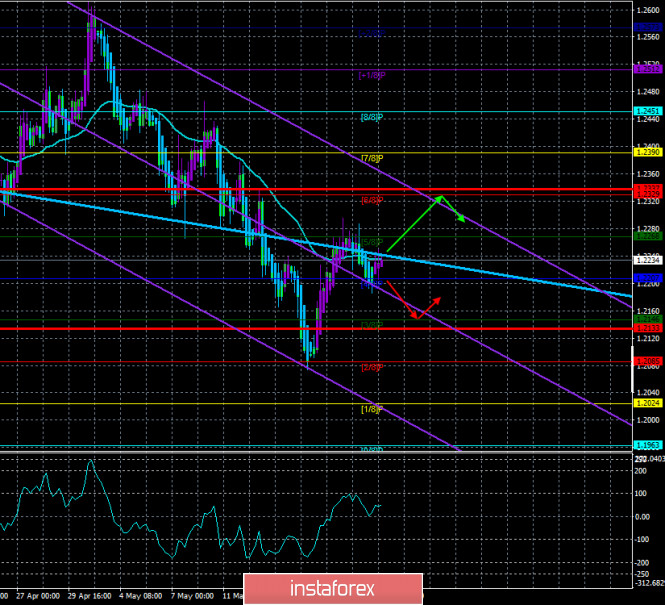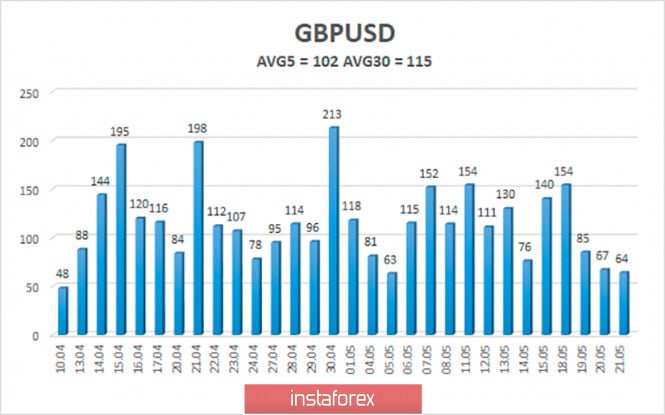4-hour timeframe

Technical details:
Higher linear regression channel: direction - downward.
Lower linear regression channel: direction - downward.
Moving average (20; smoothed) - sideways.
CCI: 51.8021
The British pound spent the fourth trading day of the week in a downward movement and settled back below the moving average line, failing to overcome the Murray level of "5/8"-1.2268. Thus, the downward movement may continue on the last trading day of the week, according to the technical picture and the general fundamental background. We have already mentioned in the article on the euro/dollar that traders continue to ignore almost all macroeconomic publications, rightly believing that the economies of all countries of the world are experiencing approximately the same problems. But the fundamental background for the British pound remains particularly negative. Due to Brexit, the policy of Boris Johnson, the low probability of concluding trade agreements with the European Union and the United States. Remember, in the early years of Brexit, when a referendum was already held, but Parliament needed to agree on a breakup plan with Brussels, the pound was regularly cheaper due to commonplace uncertainty. Investors are afraid of instability and uncertainty, so as soon as there is a situation in which it is difficult to make any forecasts, immediately the currency of this country begins to feel pressure on itself. And now we are seeing approximately the same thing. Michel Barnier and David Frost said after the second round of talks that no progress was made again, exchanged mutual accusations and parted ways until the third, final round of talks, after which the parties will have to officially decide on extending the "transition period" on July 1. It is already clear that this period will not be extended. Thus, the future of the UK and its economy is once again shrouded in fog. On the one hand, the British Ministry of Trade said that 60% of goods will be removed from European tariffs. On the other hand, British goods imported into the EU (namely, the EU is the exporter of more than 50% of all goods from the UK) will be subject to tariffs and duties, according to the rules and regulations of the WTO. Thus, London will not be able to solve the issue of the absence of a trade agreement with the EU unilaterally. Plus, do not forget that the UK budget is already suffering so much from the break with the Alliance, and the "coronavirus" pandemic can cost the country from 30% to 50% of the budget according to various calculations. Thus, this missing money will have to be taken from somewhere. Either borrow or raise taxes, fees, tariffs, and other tools to replenish the state Treasury. Accordingly, it is quite difficult to predict what will happen in the country after 2020. That is why the pound is under pressure from traders in recent weeks, while the euro currency feels more or less stable, although the Eurozone has its own problems.
On Thursday, the UK also published the index of business activity in the areas of services and products. The first rose from 13.4 to 27.8, and the second from 32.6 to 40.6. Thus, both business activity indices exceeded their forecast values. However, there was no reaction from traders to this data. On the last trading day of the week in Britain, a more significant indicator of retail sales for April is planned, which, according to forecasts, will fall by 22.2% in annual terms and by 16% in monthly terms. However, we believe that this report will be ignored, if only because a similar report in the United States and in the European Union showed approximately the same reduction. This is exactly what we were talking about. The dollar can't have an advantage based on a single report if a similar report in the United States is no better. Thus, on Friday, either the pair will resume its downward movement, according to the technical picture, or it will go flat and spend the entire day in a narrow price range.
On Friday, traders can only track unplanned events. And of course, the main newsmaker will remain the US leader Donald Trump. In fact, even many American journalists treat the figure of the US President with irony, since most of his statements most fit the description of the word "fantasy". Most of the accusations coming from the odious leader are not supported by anything. One such recent statement from trump: "China is running a massive disinformation campaign because it really wants' sleepy Joe Biden' to win the presidential race. Then they can continue to pillage the United States, as they did for decades before I came." Thus, in just two sentences, Trump managed to insult Joe Biden, hinting that he would be a lousy president, and once again China. As always, no facts were provided to confirm Trump's words. Thus, all the main theses of the Donald can already be collected in a certain collection called "Trump's Mantra" and no longer read news feeds on the request "Donald Trump", as the American leader repeats the same thing every day. Although there is one more thing that the US leader does not lose sight of. Since the US is currently experiencing an economic shock and crisis, Trump switched from statements about how much the economy has grown under him, to statements about how amazing the next quarter, year, decade will be. "I think we will have a big transition period in the third quarter. I think we will have a very good fourth quarter and an incredible year," Trump said at a regular briefing at the White House. At the same time, the President's economic adviser, Larry Kudlow, said that the economy could grow by 21.5% in the third quarter, which would be the largest growth in the country's history. To be honest, it is even difficult to comment on the next "magnificent" statement of Trump. Naturally, the US President will stop mentioning the failed first and second quarters of 2020, the decline in which will not be able to cover the third and fourth quarters. In the near future, we can also expect new statements in the style of "China wanted to destroy us, but we survived and became even stronger, and it's all thanks to me."

The average volatility of the GBP/USD pair has been steadily declining in recent days and is currently 102 points. On Friday, May 22, thus, we expect movement within the channel, limited by the levels of 1.2133 and 1.2337. A reversal of the Heiken Ashi indicator downwards will indicate a possible resumption of the downward trend. Fixing the price above the moving average will indicate the weakness of the bears.
Nearest support levels:
S1 – 1.2207
S2 – 1.2146
S3 – 1.2085
Nearest resistance levels:
R1 – 1.2268
R2 – 1.2329
R3 – 1.2390
Trading recommendations:
The GBP/USD pair on the 4-hour timeframe was fixed below the moving average, so the trend changed to a downward one. Thus, it is now recommended to trade the pound/dollar pair for a decrease with the goals of 1.2146 and 1.2085, but after the reversal of the Heiken Ashi indicator down. It is recommended to buy the pound/dollar pair if traders manage to return to the area above the moving average and after overcoming the Murray level of "5/8"-1.2268, with goals of 1.2329 and 1.2390.
The material has been provided by InstaForex Company - www.instaforex.com